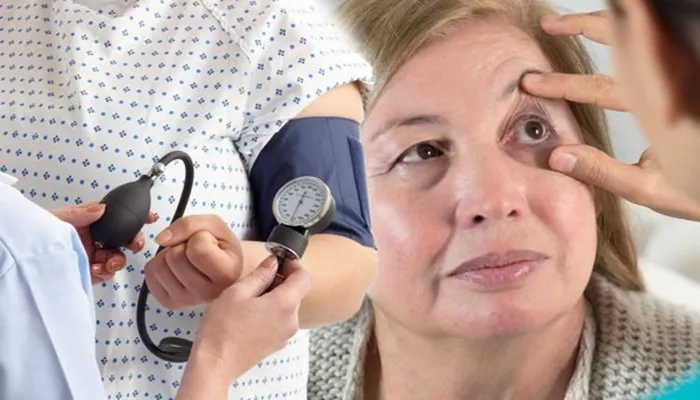Blurred vision is a common symptom of high blood pressure, also known as hypertension. When blood pressure rises, it can cause damage to the small blood vessels in the eyes, leading to various eye problems such as hypertensive retinopathy, optic neuropathy, and choroidopathy. These conditions can result in blurred vision, bleeding in the eye, and even vision loss if left untreated.
As a cardiologist, I understand the importance of maintaining healthy blood pressure levels not only for the heart but also for the eyes and overall well-being. In this article, I will discuss the link between high blood pressure and blurred vision, as well as provide strategies to solve this issue.
The Connection Between High Blood Pressure And Blurred Vision
High blood pressure can affect the eyes in several ways. It can cause damage to the optic nerve, leading to optic neuropathy.
It can also cause inflammation at the back of the eye, known as choroidopathy, which can lead to fluid buildup under the retina and distorted vision.
The most common eye condition associated with high blood pressure is hypertensive retinopathy, which occurs when the retina’s blood vessels thicken, narrow, and discourage blood flow to the retina.
When blood flow to the retina is restricted, it can cause swelling and damage to the delicate tissues in the eye. This can lead to symptoms such as blurred vision, double vision, and even vision loss in severe cases.
SEE ALSO: What Are The Types of Systemic Hypertension?
Diagnosing And Monitoring High Blood Pressure-Related Eye Problems
If you experience sudden changes in your vision, such as blurred vision or double vision, it’s essential to seek medical attention immediately.
Your ophthalmologist can perform a comprehensive eye exam to diagnose any underlying eye conditions related to high blood pressure.
During the exam, your ophthalmologist may use specialized equipment to examine the blood vessels in your eyes and check for signs of damage or inflammation. They may also dilate your pupils to get a better view of the back of your eye and look for signs of hypertensive retinopathy.
Regular eye exams are crucial for monitoring the health of your eyes and detecting any changes related to high blood pressure. If you have been diagnosed with hypertension, it’s recommended to have an annual dilated eye exam to ensure that your eyes remain healthy.
Treating High Blood Pressure-Related Eye Problems
The primary treatment for high blood pressure-related eye problems is to control your blood pressure through lifestyle changes and medication if necessary. Your cardiologist can work with you to develop a treatment plan that addresses your specific needs and helps you achieve and maintain healthy blood pressure levels.
Here are some strategies that can help lower your blood pressure and reduce the risk of eye problems:
Maintain a healthy diet: Eat a diet rich in fruits, vegetables, whole grains, and lean proteins, while limiting your intake of sodium, saturated fat, and added sugars.
Exercise regularly: Engage in regular physical activity, such as brisk walking, swimming, or cycling, for at least 30 minutes most days of the week.
Manage stress: Practice stress-reducing techniques such as meditation, deep breathing exercises, or yoga to help lower your blood pressure.
Quit smoking: Smoking can increase your risk of high blood pressure and other cardiovascular diseases.
Take medication as prescribed: If lifestyle changes alone are not enough to control your blood pressure, your cardiologist may prescribe medication to help lower your blood pressure and protect your eyes and other organs from damage.
In some cases, your ophthalmologist may also recommend specific treatments for eye-related complications of high blood pressure, such as:
Laser treatment: For severe cases of hypertensive retinopathy, your ophthalmologist may recommend laser treatment to seal leaking blood vessels or destroy abnormal blood vessels in the retina.
Intravitreal injections: For cases of macular edema (swelling of the macula) caused by hypertensive retinopathy, your ophthalmologist may recommend intravitreal injections of corticosteroids or anti-VEGF medications to reduce inflammation and swelling.
Surgery: In rare cases, surgery may be necessary to treat complications of high blood pressure-related eye problems, such as retinal detachment or severe bleeding in the eye.
Preventing High Blood Pressure-Related Eye Problems
The best way to prevent high blood pressure-related eye problems is to maintain healthy blood pressure levels through lifestyle changes and regular monitoring. Here are some tips to help you prevent or manage high blood pressure and protect your eyes:
Monitor your blood pressure regularly: Check your blood pressure at home or at a pharmacy and keep track of your readings.
Maintain a healthy weight: Excess weight can increase your risk of high blood pressure and other cardiovascular diseases.
Limit alcohol intake: Excessive alcohol consumption can raise blood pressure.
Get enough sleep: Lack of sleep can contribute to high blood pressure.
Manage other health conditions: If you have diabetes or other health conditions that can affect your blood pressure, work with your healthcare team to manage these conditions effectively.
Attend regular eye exams: Even if you don’t have any vision problems, it’s important to have regular eye exams to detect any changes in your eye health related to high blood pressure.
Conclusion
High blood pressure can have serious consequences for your eye health, including blurred vision and even vision loss. As a cardiologist, I strongly recommend taking steps to maintain healthy blood pressure levels through lifestyle changes and regular monitoring. If you experience sudden changes in your vision or have been diagnosed with hypertension, it’s crucial to work with your healthcare team, including your cardiologist and ophthalmologist, to protect your eye health and overall well-being.

